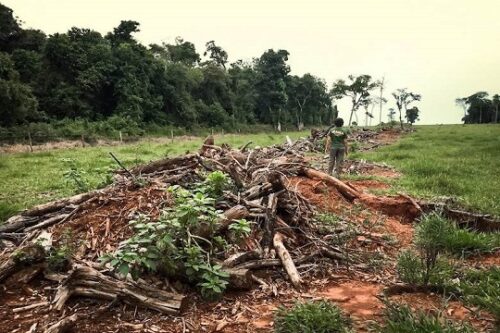 An agent from the Brazilian Institute of the Environment and Renewable Natural Resources (IBAMA) assesses damage from deforestation in Mato Grosso do Sul.
It said regulations aimed at guaranteeing to consumers that the products on offer to them have no link to deforestation are currently under consideration in the European Union, Japan, the US and the UK.
The organisation said: “ICT wholly supports action to reduce deforestation in the world’s vulnerable forest regions and recognises the need to for greater transparency and traceability in supply chains to facilitate those actions. However, such actions must be targeted at those parts of the supply chain that drive deforestation, and not at associated sectors that have no influence on it.”
Leather manufacturing, it said in the statement, is one of those associated sectors. And it added: “Leather does not drive the rearing of livestock, and the production of leather is all but incidental to it.”
It quoted 2021 research from Montana State University that shows that demand for hides for leather has no direct influence on the number of animals reared and slaughtered. “As a customer of the meat industry, leather manufacturers have no influence on the first stages of the supply chain and are not involved in the sourcing and tracing of livestock,” the statement said.
Hides are of little importance to the meat value chain, it pointed out, representing an average of 1% of the animal’s value, and with up to 40% of hides, globally, simply thrown away. And of the hides that do reach leather manufacturers, they often arrive without traceability information as tags and other identification tools have been lost at the slaughterhouse.
“The chain of custody and legal requirements to provide information downstream applies only for the food chain; hides and skins are not normally subject to these requirements. As such, it may be impossible for leather manufacturers to obtain information to meet the demands of the proposed legislation.”
ICT warned that whether or not the requirements of these regulations can be met by the leather sector, it will have no impact upstream, on the number of animals reared and slaughtered, or the amount of forest cleared to raise them.
“As such, ICT firmly believes that leather should be excluded from the scope of the proposed regulations,” it concluded. “A regulation that eliminates deforestation from meat supply chains will by association, eliminate it from leather supply chains without the need for specific regulation for leather.”
It said the global leather industry does not deny its place in the livestock value chain, or that there is a possibility that certain supply chains include deforestation-risk hides. It insisted it would play a part in resolving issues around transparency and traceability of raw materials sourced from regions with a risk of deforestation. “Expectations must be tempered with pragmatism,” it said. “Leather manufacture does not drive deforestation and should not be regulated as such.”
An agent from the Brazilian Institute of the Environment and Renewable Natural Resources (IBAMA) assesses damage from deforestation in Mato Grosso do Sul.
It said regulations aimed at guaranteeing to consumers that the products on offer to them have no link to deforestation are currently under consideration in the European Union, Japan, the US and the UK.
The organisation said: “ICT wholly supports action to reduce deforestation in the world’s vulnerable forest regions and recognises the need to for greater transparency and traceability in supply chains to facilitate those actions. However, such actions must be targeted at those parts of the supply chain that drive deforestation, and not at associated sectors that have no influence on it.”
Leather manufacturing, it said in the statement, is one of those associated sectors. And it added: “Leather does not drive the rearing of livestock, and the production of leather is all but incidental to it.”
It quoted 2021 research from Montana State University that shows that demand for hides for leather has no direct influence on the number of animals reared and slaughtered. “As a customer of the meat industry, leather manufacturers have no influence on the first stages of the supply chain and are not involved in the sourcing and tracing of livestock,” the statement said.
Hides are of little importance to the meat value chain, it pointed out, representing an average of 1% of the animal’s value, and with up to 40% of hides, globally, simply thrown away. And of the hides that do reach leather manufacturers, they often arrive without traceability information as tags and other identification tools have been lost at the slaughterhouse.
“The chain of custody and legal requirements to provide information downstream applies only for the food chain; hides and skins are not normally subject to these requirements. As such, it may be impossible for leather manufacturers to obtain information to meet the demands of the proposed legislation.”
ICT warned that whether or not the requirements of these regulations can be met by the leather sector, it will have no impact upstream, on the number of animals reared and slaughtered, or the amount of forest cleared to raise them.
“As such, ICT firmly believes that leather should be excluded from the scope of the proposed regulations,” it concluded. “A regulation that eliminates deforestation from meat supply chains will by association, eliminate it from leather supply chains without the need for specific regulation for leather.”
It said the global leather industry does not deny its place in the livestock value chain, or that there is a possibility that certain supply chains include deforestation-risk hides. It insisted it would play a part in resolving issues around transparency and traceability of raw materials sourced from regions with a risk of deforestation. “Expectations must be tempered with pragmatism,” it said. “Leather manufacture does not drive deforestation and should not be regulated as such.” 我们为皮革、物料及时装业界创造面对面洽谈的机会,为客户缔造实质商机。我们云集世界各地的商家,让他们寻找新的合作伙伴,发掘潜在客户或供应商,并掌握业界最新发展。
我们主办多个专注时尚及生活潮流的商贸展览会, 为这不断变化的行业,提供最全面的买家及参展商服务,方便他们了解急速转变的行业环境,并预测来季趋势。

使用条款 | 隐私政策 | APLF 可持续发展